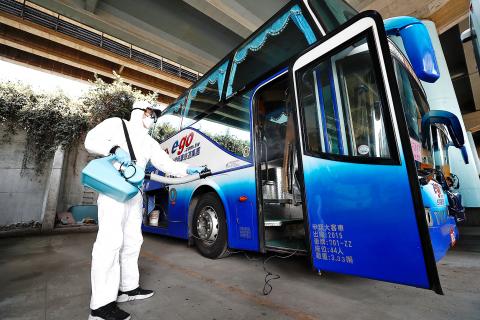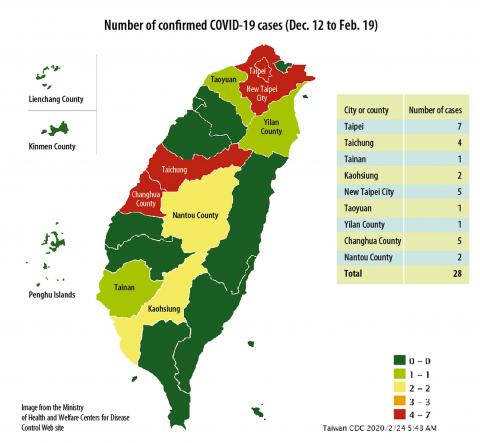The government’s travel notice for South Korea has been raised to a level 3 “warning” — avoid all nonessential travel — due to a jump in the number of COVID-19 cases there, the Central Epidemic Command Center (CECC) said yesterday, adding that two more cases have been confirmed in Taiwan.
The community spread of the virus in South Korea has been shown by the rapid increase in confirmed cases in the past few days, which totaled 763 yesterday, Minister of Health and Welfare Chen Shih-chung (陳時中) said.
“As the risk of infection is elevated in the country, the center decided to raise the travel notice to level 3,” said Chen, who serves as the center’s head. “We recommend people avoid all nonessential travel.”

Photo: Ritchie B. Tongo / EPA-EFE
As of 12am today, all foreign nationals arriving in Taiwan from South Korea would be placed under a 14-day mandatory home quarantine, he said.
Taiwanese passengers arriving today and tomorrow would be asked to implement a 14-day self-health management period, but as of 12am on Thursday, everyone arriving from South Korea would be put under a 14-day quarantine, he said.
The Ministry of Foreign Affairs issued an “orange” warning on travel to South Korea, advising people to avoid unnecessary travel to the nation, but issued the highest “red” warning on travel to Daegu, Gyeongsang-bukdo and Cheongdo-gun, where the South Korean government has declared special management zones, Chen said.

When asked if similar border controls would be imposed on passengers arriving from Japan, Chen said Japan is “on the edge of” being listed at a higher warning level.
The number of confirmed cases in Japan is relatively high, with locations spread across the nation, including Okinawa and Hokkaido, he said.
“The CECC is closely observing and discussing the COVID-19 epidemic situations in Japan, Singapore, Thailand, Italy and Iran, and we will make proper decisions if the outbreaks in these areas become worse,” he said.
The two new confirmed cases of COVID-19 in Taiwan, the 29th and 30th, are family members of the two cases announced on Sunday — an octogenarian father and one of his sons, who is in his 50s — the younger son and older man’s wife, he said, adding that a contact investigation into the family cluster infection is under way.
Chen confirmed that a Taiwanese hemophiliac, who had been stranded in Wuhan, China, with his mother since that city was locked down on Jan. 23, was to return to Taiwan on a flight from Chengdu last night.
The teen’s doctor had assessed his condition through telemedicine and a nurse had been deployed to Chengdu to help them take proper protective measures before and during the flight, Chen said.
The pair would be separated from other passengers during the flight, and be taken to an isolation ward in a hospital after being tested for COVID-19 upon arrival, he said.
If they test negative twice, they would be moved to a quarantine station for a 14-day stay, he added.
The teen’s case had required special medical consideration and protective measures, he said, adding that Taiwanese stranded in Wuhan must return home on charter flights and undergo a quarantine period after arrival.

Intelligence agents have recorded 510,000 instances of “controversial information” being spread online by the Chinese Communist Party (CCP) so far this year, the National Security Bureau (NSB) said in a report yesterday, as it warned of artificial intelligence (AI) being employed to generate destabilizing misinformation. The bureau submitted a written report to the Legislative Yuan in preparation for National Security Bureau Director-General Tsai Ming-yen’s (蔡明彥) appearance before the Foreign Affairs and National Defense Committee today. The CCP has been using cognitive warfare to divide Taiwanese society by commenting on controversial issues such as Taiwan Semiconductor Manufacturing Co’s (TSMC, 台積電) investments in the

HELPING HAND: The steering committee of the National Stabilization Fund is expected to hold a meeting to discuss how and when to utilize the fund to help buffer the sell-off The TAIEX plunged 2,065.87 points, or 9.7 percent, to close at 19,232.35 yesterday, the highest single-day percentage loss on record, as investors braced for US President Donald Trump’s tariffs after an extended holiday weekend. Amid the pessimistic atmosphere, 945 listed companies led by large-cap stocks — including Taiwan Semiconductor Manufacturing Co (TSMC, 台積電), Hon Hai Precision Industry Co (鴻海精密) and Largan Precision Co (大立光) — fell by the daily maximum of 10 percent at the close, Taiwan Stock Exchange data showed. The number of listed companies ending limit-down set a new record, the exchange said. The TAIEX plunged by daily maxiumu in just

INVESTIGATION: The case is the latest instance of a DPP figure being implicated in an espionage network accused of allegedly leaking information to Chinese intelligence Democratic Progressive Party (DPP) member Ho Jen-chieh (何仁傑) was detained and held incommunicado yesterday on suspicion of spying for China during his tenure as assistant to then-minister of foreign affairs Joseph Wu (吳釗燮). The Taipei District Prosecutors’ Office said Ho was implicated during its investigation into alleged spying activities by former Presidential Office consultant Wu Shang-yu (吳尚雨). Prosecutors said there is reason to believe Ho breached the National Security Act (國家安全法) by leaking classified Ministry of Foreign Affairs information to Chinese intelligence. Following interrogation, prosecutors petitioned the Taipei District Court to detain Ho, citing concerns over potential collusion or tampering of evidence. The

‘COMPREHENSIVE PLAN’: Lin Chia-lung said that the government was ready to talk about a variety of issues, including investment in and purchases from the US The National Stabilization Fund (NSF) yesterday announced that it would step in to staunch stock market losses for the ninth time in the nation’s history. An NSF board meeting, originally scheduled for Monday next week, was moved to yesterday after stocks plummeted in the wake of US President Donald Trump’s announcement of 32 percent tariffs on Taiwan on Wednesday last week. Board members voted to support the stock market with the NT$500 billion (US$15.15 billion) fund, with injections of funds to begin as soon as today. The NSF in 2000 injected NT$120 billion to stabilize stocks, the most ever. The lowest amount it